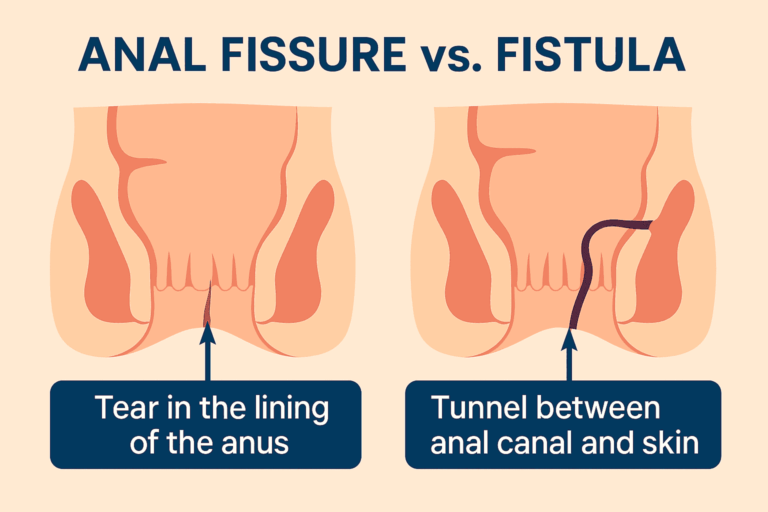Many people confuse anal fissures and anal fistulas because both cause pain and discomfort in the anal region. However, they are completely different medical conditions that require different treatment approaches.
If you have ever experienced pain or discomfort during bowel movements and wondered whether it’s a fissure or a fistula, this blog will help you understand the differences, symptoms, causes, and treatments for both conditions — so you can seek the right medical help without delay.
What Is an Anal Fissure?
An anal fissure is a small tear or crack in the lining of the anus, often caused by passing hard stools or straining during bowel movements. Although it is a surface-level injury, it can be extremely painful because it exposes sensitive nerve endings.
Common Causes of Anal Fissure
-
Passing dry or hard stools
-
Chronic constipation or diarrhea
-
Straining during bowel movements
-
Tight anal muscles that make stool passage difficult
-
Trauma or injury to the anal area (e.g., during childbirth)
-
Less commonly, inflammatory bowel diseases like Crohn’s disease
Symptoms of Anal Fissure
-
Sharp, burning pain during and after bowel movements
-
Bright red blood on toilet paper or stool
-
Swelling or inflammation around the anal area
-
Visible small tear near the anal opening
-
Painful muscle spasms
What Is an Anal Fistula?
An anal fistula is an abnormal tunnel that forms between the anal canal and the skin near the anus. It often develops after an infection in the anal glands, leading to an abscess that fails to heal completely.
Common Causes of Anal Fistula
-
Untreated anal gland infection or abscess
-
Chronic inflammatory bowel diseases (e.g., Crohn’s disease, ulcerative colitis)
-
Injury to the anal region
-
Rarely, chronic infections like tuberculosis or certain cancers
Symptoms of Anal Fistula
-
Persistent pus or blood discharge near the anus
-
Swelling and redness around the anal opening
-
Pain that worsens while sitting or moving
-
Irritation and skin damage from constant discharge
-
Fever or general unwellness during infection
Anal Fissure vs. Fistula: Key Differences
|
Point of Difference |
Anal Fissure |
Anal Fistula |
|
What it is |
Tear in the lining of the anus |
Tunnel between anal canal and skin |
|
Main Cause |
Hard stools, constipation, diarrhea, straining |
Infection or abscess |
|
Pain Level |
Sharp, burning pain during bowel movement |
Discomfort with swelling or discharge |
|
Bleeding |
Bright red blood during bowel movement |
May have blood, but pus discharge is common |
|
Healing |
Often heals with lifestyle changes |
Usually requires surgery |
|
Common Symptoms |
Pain, bleeding, itching, spasms |
Persistent discharge, swelling, abscess |
|
Treatment |
Diet, ointments, sitz baths |
Fistulotomy, laser, seton placement |
|
Recurrence Risk |
Low if bowel habits are healthy |
High without surgery |
Treatment Options for Anal Fissures
Most anal fissures heal naturally with proper care, but persistent cases may need medical or surgical intervention.
Common Treatments:
-
Lifestyle changes – High-fiber diet, adequate water intake, avoiding straining
-
Sitz baths – Sitting in warm water for 10–15 minutes, 2–3 times daily
-
Topical ointments – To relax the anal sphincter and promote healing
-
Surgery/Botox – For severe or chronic fissures to reduce muscle tension
Treatment Options for Anal Fistulas
Unlike fissures, fistulas rarely heal on their own and often require surgery.
Common Treatments:
-
Antibiotics – To treat active infections
-
Incision & drainage – For pus-filled abscesses before fistula repair
-
Surgical procedures – Fistulotomy, seton placement, or minimally invasive laser treatment for quicker recovery
-
Post-operative care – Maintaining hygiene and following wound care instructions
Prevention Tips
For Anal Fissures
-
Eat a fiber-rich diet (fruits, vegetables, whole grains)
-
Drink plenty of water
-
Avoid straining during bowel movements
-
Treat constipation or diarrhea promptly
-
Practice gentle anal hygiene
For Anal Fistulas
-
Treat anal abscesses early
-
Maintain good anal hygiene
-
Manage chronic conditions like Crohn’s disease
-
Seek medical help for persistent swelling or discharge
Expert Treatment in Gurgaon
If you are looking for expert care for anal fissure or anal fistula treatment in Gurgaon, consider consulting Dr. Vikram Aryan, one of the best general surgeons in the region.
He offers painless laser treatments for fissures and advanced fistula surgeries with high success rates and minimal discomfort.
Conclusion
While anal fissures and fistulas affect the same region, they differ in causes, symptoms, and treatment methods. Understanding these differences ensures you get the right treatment at the right time.
If you’re experiencing symptoms, don’t delay — early treatment leads to faster recovery and fewer complications.
Thank you, TrickyBlogs, for giving us the opportunity to share free, informative health articles and help more people make informed decisions about their health.





